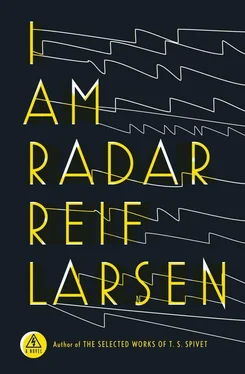“Lars!” he shouted. He kicked open the mosquito net, tumbled out of bed, and tripped over a bucket of electronics before emerging from the container. “Lars!”
As soon as he stepped outside, however, he sensed a difference in the air. A heaviness. The river was cocooned in a haze, the banks on either side barely visible.
He found Lars drinking coffee by the fire pit. His eyes were puffy. He didn’t look well.
“Do you have the charger for this phone?” he asked, holding up the mobile.
Lars gave him a weary look. He shook his head. “I think I left it in the van,” he said. “I’m sorry. We could probably cook something up.”
“Are you okay? You don’t look so good.”
“I feel a little off. Something I ate, I think. I’m sure it’ll pass.”
Radar drifted up to the side of the ship, where Horeb was drumming. He looked out at the hazy sky.
“It’s foggy,” he said to Horeb.
“That isn’t fog,” said Horeb.
Professor Funes, whom Radar had not seen again since his speech several evenings ago, emerged from the pousser in the shadow of his giant parasol, his driver in tow. They made their way out onto the deck of the barge. The professor did not acknowledge Radar or Horeb as he and his driver spoke rapidly in Lingala, gesturing at the horizon. Radar realized this was the first time Funes had been outside in the daylight since their departure.
The birds flew overhead. Of the thirteen hundred or so that had once made up the original flock, there were only a couple of dozen left. It seemed this last night in particular had taken a toll. The few that remained appeared especially restless, flitting this way and that.
Funes walked to the head of the barge. A few birds dived and tried landing on his parasol, bouncing awkwardly off its dome. He lightly jiggled the umbrella as if shaking off a layer of rain, but otherwise he ignored the creatures.
“What is it?” said Radar, approaching them.
Funes continued speaking with the driver for some time before breaking into a wet, hacking cough. It was a cough that came from deep inside the lungs, a cough that instantly revealed the extent of the decay within. The parasol trembled as Funes doubled over, scattering a few lingering birds into the air. Finally, when he had regained his composure, Funes turned to Radar. His face was blotched in an irregular pattern, like the map of a coastline.
“Smoke,” he whispered hoarsely. “That is smoke.”
By the afternoon the smoke had enveloped them. The air was thick with ash; it smelled as if the sky had been expelled from the inside of the earth. No one on the barge spoke. Otik retreated to the theater wagon and the malaise of his vircator. Perhaps he was trying to beckon the few remaining birds, who now seemed to have little or no connection with the performance and only hung around the barge out of reluctant familiarity. Lars, complaining that he felt unwell, stayed inside the container all day, making little notations into a black book that he kept by his cot.
Radar tried listening to his radio for some news of the smoke, but he heard only the usual hodgepodge of sermons, rumba, and indecipherable mutterings. He made an attempt at jerry-rigging a power cord for the cell phone, but the voltage was not right, and when he connected it to the power source he smelled the telltale scent of burning circuitry. He quickly unplugged the phone, but it was already too late. He would now have to dismantle the chassis and examine the motherboard. This would take hours. He halfheartedly started in, but he found his momentum had been sapped. He couldn’t concentrate. He went up to the bow again and tried joining Horeb’s drumbeat with his radios, but Horeb waved him away.
“I need to speak alone,” he said. As he said this, a distant drumming rose from the northern bank. Horeb’s head shot up like a rabbit. He listened, then answered on the drum:

“What’re you saying?” asked Radar.
“I’m saying: ‘He is near, he is coming, get ready. .’”
“Who is near?”
But Horeb had gone back to banging out the same pattern on his drums. Again and again, the mantra was repeated, dismantled, copied, and dispersed into the haze.
At some point, they entered the magical hour when the tropical sun began to tumble from the sky, the story of the day draining away into nothing, light becoming shadow and shadow becoming light. Standing at the stern, Radar reached out and caught a piece of skin floating through the air. It was a page, charred, still warm to the touch. For a brief instant, Radar could almost read the text on its face, but then the paper dissolved in his hands. He looked and saw that the river was full of these ashen pages, floating like lily pads. Pages drifting through the sky. It was snowing in the jungle.
“Ay yeah! Mayee! Ah yeah! Mayee!” called out the sounder.
They came around a bend in the river, and then there it was. The source of all things. The fire. The world was on fire.
He could hear the flames. He could hear them because the pousser had cut its motor and the sounder had gone quiet. They glided toward the fire, which arced up forty, fifty feet into the air, the smoke so thick and black it looked as if it were made of hair. The current began to slow their progress, pushing them away, the river urging them not to come any closer. They reached a standstill, an equilibrium, and for a second it felt as if they were turning back, but then the pousser fired its engines and pressed them forward, toward what Radar now knew could only be the library.
From the deck of the barge, they watched the world collapse. Even from this distance, the heat curling the hair on their skin. A heat like no other. A heat of creation.
“Lars. .” Otik called, and Lars emerged from inside, woozy. He stopped and stared.
The barge slid up against a sandy beach. A fireball exploded into the sky. The gangplank was extended, and Professor Funes limped down it, stumbling, coughing in the smoke. He was without his parasol. His hat blew off into the reeds, revealing a stark white skull. Once on the riverbank, he started to move toward the fire, shielding his face from the waves of heat.
Radar looked and saw that the woods were suddenly alive with faces. They watched as Funes walked down the beach toward the flames. Above him, the birds were gathering, following.
Horeb was standing at the bow with his drums, drumming to the faces in the woods. All at once, Radar realized he was the one who had told them to do this.
He is near, he is coming, get ready. .
Funes had reached the flames. He paused. The birds overhead, waiting as one.
“The show,” said Lars. “It’s now.”
A book is a touched thing. Countless hands contributed to making the object you now hold in your hands — some knowingly, others unknowingly. This project, in particular, drew upon the expertise of many generous people who helped fill in the landscape when my own brain failed.
First and foremost, I feel incredibly lucky to be teamed with my incredible agent, Denise Shannon, who has always been my champion and confidante. I also hold much admiration for my editor, Ann Godoff, who possesses a rare and steady wisdom and trusts in the often messy process of creation. Thanks to the entire team at Penguin Press, who put up with all of my tiny demands and sailed the ship safely into harbor: Benjamin Platt, Veronica Windholz, Claire Vaccaro, Meighan Cavanaugh, Will Palmer, Sofia Groopman, and Darren Haggar, for his astounding cover. A special thanks to Stuart Williams, my editor at Harvill Secker, who read the book many times and always found ways to make it better. And to my other genius, generous editors: Hans Jorgen Balmes, Maggie Doyle, Lidewijde Paris, Elena Ramirez, and Nicole Winstanley. Thanks also to my agents Dean Cooke and Judith Murray.
Читать дальше













